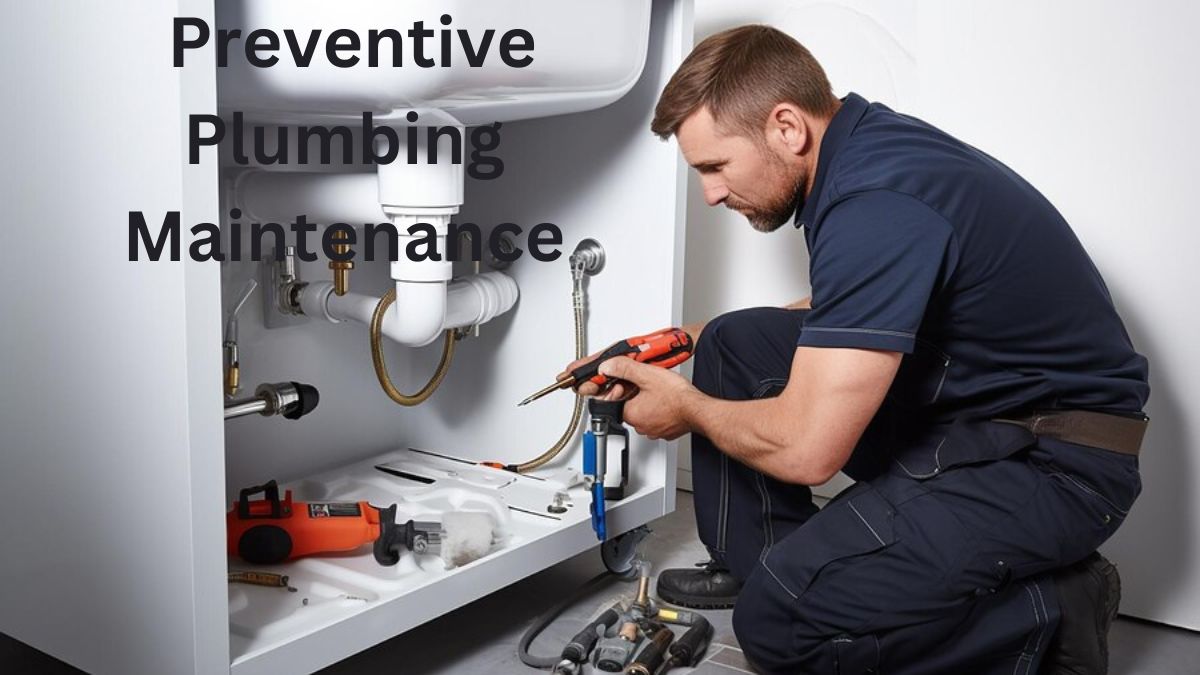Is there anything more frustrating than a plumbing emergency catching you off guard? From leaky faucets to clogged drains, these problems always seem to happen at the most inconvenient times. But what if I told you that with preventive plumbing maintenance, you could save money and stress in the long run? Let’s dive into how regular upkeep can keep your plumbing system running smoothly and prevent common issues before they even start!
Common Plumbing Issues That Can Be Prevented with Regular Maintenance
Plumbing issues can be a real headache if left unchecked. One common problem that regular maintenance can prevent is clogged drains and pipes. Over time, hair, soap scum, and other debris build up, causing blockages that lead to slow drainage or backups. By routinely cleaning your drains, you can avoid these pesky clogs.
Leaky faucets and toilets are another nuisance that preventive maintenance can address. A dripping faucet or a running toilet may seem minor at first but can waste gallons of water over time, impacting both the environment and your wallet. Checking for leaks regularly and fixing them promptly can help save water and money in the long run.
Water heater problems are also preventable with proper maintenance. Sediment buildup, leaks, or inefficient heating could signal potential issues with your water heater. Regular inspections and flushing out sediment can extend the lifespan of your water heater and ensure hot water supply when needed most.
Stay ahead of these common plumbing problems by incorporating preventive maintenance into your routine – it’s worth it!
Clogged drains and pipes
Dealing with clogged drains and pipes is every homeowner’s nightmare. It always seems to happen at the most inconvenient times, like when you’re rushing to get ready for work or hosting guests for a dinner party. The good news is that regular preventive plumbing maintenance can help avoid this messy situation altogether.
Hair, soap scum, food particles, and grease are common culprits that lead to clogs in your drains. Over time, these substances build up and create blockages that impede the flow of water. By taking proactive steps such as using drain strainers and periodically cleaning out your pipes, you can prevent these obstructions from occurring.
Don’t wait until a small clog turns into a major plumbing issue. Stay ahead of the game by incorporating simple DIY maintenance tasks into your routine. Your drains will thank you!
Leaky faucets and toilets
Leaky faucets and toilets may seem like minor issues, but they can lead to significant water wastage and increased utility bills. The constant drip-drip sound from a leaky faucet can be annoying as well! Not to mention the potential damage it can cause to your fixtures and surrounding areas.
A leaking toilet is not only wasteful but could also indicate a more serious problem with the plumbing system. It’s essential to address these leaks promptly to prevent further damage and save on water costs. Ignoring them could result in mold growth or even structural damage over time.
Regularly checking for leaks, replacing worn-out washers, or tightening connections are simple maintenance tasks that can prevent these issues. Taking care of leaky faucets and toilets proactively will help you avoid unnecessary expenses and preserve your home’s plumbing system in the long run.
Water heater problems
Water heater problems can be a real headache if left unchecked. Imagine waking up to a cold shower on a chilly morning – not the best way to start your day, right? Regular preventive maintenance can help avoid such situations. Sediment buildup is a common issue in water heaters that can lead to reduced efficiency and even malfunctions.
To prevent water heater problems, it’s essential to flush out the tank periodically to remove any sediment or mineral deposits. This simple step can help maintain optimal performance and extend the lifespan of your water heater. Additionally, checking for leaks in the system and inspecting the pressure relief valve regularly are important tasks that shouldn’t be overlooked.
By taking proactive measures and addressing potential issues early on, you can ensure that your water heater operates smoothly and efficiently when you need it most. Stay ahead of water heater problems with preventive maintenance for peace of mind and hot showers all year round!
Benefits of Preventive Plumbing Maintenance:
Investing in preventive plumbing maintenance comes with a range of benefits that can save you both money and stress in the long run. By regularly inspecting and maintaining your plumbing system, you can catch potential issues early on before they escalate into costly problems. This proactive approach not only helps prevent emergencies but also extends the lifespan of your pipes, fixtures, and appliances.
One significant benefit of preventive maintenance is its cost-saving nature. Addressing minor repairs or leaks promptly can prevent them from turning into major water damage incidents that require expensive repairs or replacements. Moreover, by keeping your plumbing system well-maintained, you can avoid unexpected breakdowns that could disrupt your daily routine and lead to inconvenience.
In addition to financial savings, preventive plumbing maintenance also contributes to reducing stress levels associated with sudden plumbing emergencies. Knowing that your pipes are in good condition provides peace of mind and allows you to focus on other aspects of homeownership without worrying about potential leaks or clogs disrupting your day-to-day life.
Saves money in the long run
Are you tired of unexpected plumbing repairs draining your wallet? Preventive plumbing maintenance can help you save money in the long run. By addressing small issues before they escalate, you can avoid costly emergency repair bills that often accompany neglected plumbing systems.
Regularly scheduled maintenance checks can identify potential problems early on, allowing for timely and cost-effective solutions. Whether it’s fixing a minor leak or clearing a clogged drain, taking proactive measures can prevent larger and more expensive issues from arising down the line.
By investing in preventive plumbing maintenance now, you are essentially safeguarding your finances against major repair expenses later. Think of it as an insurance policy for your pipes – saving you both money and hassle in the future.
Don’t wait until a small drip turns into a flood; take control of your plumbing system’s health today to secure your financial well-being tomorrow.
Reduces stress and inconvenience
Dealing with unexpected plumbing issues can be a major source of stress and inconvenience in any household. The last thing you want is to wake up to a flooded bathroom or have your kitchen sink suddenly clog up when you’re trying to prepare dinner for your family.
Imagine the frustration of not being able to take a relaxing shower after a long day at work because your water heater decided to act up. These situations can easily escalate into costly repairs and disrupt your daily routine.
By scheduling regular preventive maintenance for your plumbing system, you can significantly reduce the chances of these unpleasant surprises occurring. A professional plumber can inspect your pipes, drains, faucets, and other components to catch any potential problems early on before they turn into emergencies.
Taking proactive steps to care for your plumbing not only saves you money in the long run but also helps you avoid unnecessary stress and inconvenience that come with sudden breakdowns. Prioritizing preventive maintenance will keep everything running smoothly and give you peace of mind knowing that your plumbing is in good condition.
Increases lifespan of plumbing system
One significant benefit of preventive plumbing maintenance is the increase in the lifespan of your entire plumbing system. By taking proactive steps to address any potential issues early on, you can prevent major problems from developing and causing extensive damage to your pipes, fixtures, and appliances.
Regularly inspecting and maintaining your plumbing system helps identify small leaks or corrosion that could lead to more significant issues over time. By addressing these minor concerns promptly, you can extend the life of your pipes and prevent costly replacements down the line.
Additionally, a well-maintained plumbing system operates more efficiently, reducing wear and tear on its components. This efficiency not only prolongs the lifespan of your plumbing but also contributes to lower utility bills by conserving water and energy.
Investing in preventive maintenance for your plumbing system is like giving it a long-lasting care plan that ensures smooth operation for years to come. So don’t wait until a major problem arises – prioritize regular upkeep to maximize the longevity of your home’s essential infrastructure.
Tips for DIY Plumbing Maintenance:
When it comes to DIY plumbing maintenance, a few simple tasks can go a long way in preventing costly issues down the line. Regularly cleaning drains and pipes is key to avoiding clogs and backups. Using natural solutions like baking soda and vinegar can help keep things flowing smoothly.
Checking for leaks is another essential step in maintaining your plumbing system. Even small drips from faucets or toilets can add up to significant water waste over time. Be sure to address any leaks promptly by replacing washers or seals as needed.
In addition to these basic maintenance tasks, keeping an eye on water pressure and temperature can help catch potential problems early on. If you notice sudden changes in either, it’s best to investigate further or call in a professional for assistance.
By staying proactive with DIY plumbing maintenance, you can save yourself both money and stress in the long run.
Regularly clean drains and pipes
Maintaining clean drains and pipes is crucial for the overall health of your plumbing system. Over time, debris like hair, grease, and soap scum can accumulate in your pipes, leading to clogs and blockages. To prevent this from happening, it’s essential to regularly clean out your drains.
One simple way to keep your drains clear is by using a mixture of baking soda and vinegar. Pouring this down the drain followed by hot water can help break down any buildup inside the pipes. Additionally, investing in a drain strainer for sinks and showers can catch larger particles before they go down the drain.
For stubborn clogs or if you notice slow drainage, consider using a plumbing snake or auger to remove blockages deep within the pipes. By taking preventive measures to maintain clean drains and pipes, you can avoid costly repairs and ensure smooth water flow throughout your home.
Check for leaks and fix them immediately
Regular preventive plumbing maintenance is key to avoiding costly and inconvenient issues down the line. By taking simple steps like regularly cleaning drains, checking for leaks, and fixing them promptly, you can save money on repairs and increase the lifespan of your plumbing system. Remember, a little effort now can go a long way in preventing stress and unexpected expenses in the future. Stay proactive with your plumbing maintenance to keep everything running smoothly!






